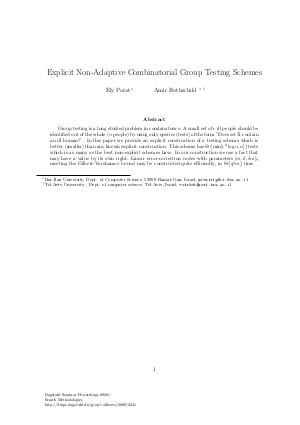Explicit Non-Adaptive Combinatorial Group Testing Schemes
Authors Ely Porat, Amir Rotschild
-
Part of:
Volume:
Dagstuhl Seminar Proceedings, Volume 9281
Part of: Series: Dagstuhl Seminar Proceedings (DagSemProc) - License:
 Creative Commons Attribution 4.0 International license
Creative Commons Attribution 4.0 International license
- Publication Date: 2009-11-10
File

PDF
DagSemProc.09281.2.pdf
- Filesize: 215 kB
- 13 pages
Document Identifiers
Subject Classification
Keywords
- Prime Numbers
- Group Testing
- Streaming
- Pattern Matching
Metrics
- Access Statistics
-
Total Accesses (updated on a weekly basis)
0PDF Downloads0Metadata Views
Abstract
Group testing is a long studied problem in combinatorics: A small set of r ill people should be identified out of the whole (n people) by using only queries (tests) of the form "Does set X contain an ill human?". In this paper we provide an explicit construction of a testing scheme which is better (smaller) than any known explicit construction. This scheme has \Theta(min[r2 log n, n])tests which is as many as the best non-explicit schemes have. In our construction we use a fact that may have a value by its own right: Linear error-correction codes with parameters [m, k, \delta m]q meeting the Gilbert-Varshamov bound may be constructed quite efficiently, in \Theta[q^{k}m) time.
Cite As Get BibTex
Ely Porat and Amir Rotschild. Explicit Non-Adaptive Combinatorial Group Testing Schemes. In Search Methodologies. Dagstuhl Seminar Proceedings, Volume 9281, pp. 1-13, Schloss Dagstuhl – Leibniz-Zentrum für Informatik (2009)
https://doi.org/10.4230/DagSemProc.09281.2
BibTex
@InProceedings{porat_et_al:DagSemProc.09281.2,
author = {Porat, Ely and Rotschild, Amir},
title = {{Explicit Non-Adaptive Combinatorial Group Testing Schemes}},
booktitle = {Search Methodologies},
pages = {1--13},
series = {Dagstuhl Seminar Proceedings (DagSemProc)},
ISSN = {1862-4405},
year = {2009},
volume = {9281},
editor = {Rudolf Ahlswede and Ferdinando Cicalese and Ugo Vaccaro},
publisher = {Schloss Dagstuhl -- Leibniz-Zentrum f{\"u}r Informatik},
address = {Dagstuhl, Germany},
URL = {https://drops.dagstuhl.de/entities/document/10.4230/DagSemProc.09281.2},
URN = {urn:nbn:de:0030-drops-22414},
doi = {10.4230/DagSemProc.09281.2},
annote = {Keywords: Prime Numbers, Group Testing, Streaming, Pattern Matching}
}
